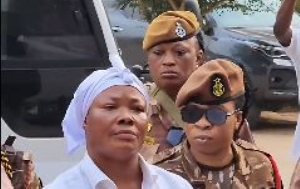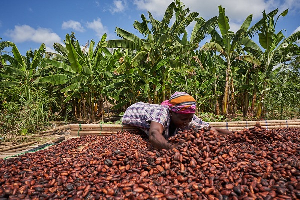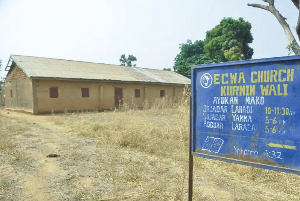General News of Saturday, 19 December 2020
Source: GNA
STAGE project empowers 263 young women in Mamprugu-Moagduri
The Strategic Approaches to Girls’ Education (STAGE) project being implemented by AfriKids Ghana, a child rights organization, has empowered 263 out-of-school young women in the Mamprugu-Moagduri District of the North East Region with Vocational skills.
The six months’ project has equipped young girls in 10 communities in the district in various accelerated learning programmes and vocational training skills, including making of soap, pastries, beads, beads sandals, hair plating and waakye (Rice and Beans) preparation with one beneficiary venturing into vegetable farming.
At a short graduation ceremony at Yagaba, the district capital, Ms Lena Naaso, the Safeguarding Officer of the STAGE project, who spoke on behalf of Mr Richard Amoah, the Project Coordinator, said the life-saving intervention was being implemented in partnership with the World Education.
It has funding support from the Department of International Development (DFID) of the United Kingdom through its Girls Education Challenge (GEC) project, which seeks to address barriers that vulnerable and marginalized girls face in achieving an education.
According to the Safeguarding Officer, the STAGE project consist of two parts, including the formal track which sought to empower young girls between the ages of 10 to 14 with nine months of literacy, numeracy and life skills lessons before transitioning them into the formal educational system.
“The non-formal track, which is our focus for today, sought to provide vocational skills training for 263 out-of-school girls aged 15 to 19 in 10 communities including Yagaba, Prima, Tantala, Jadema, Kobore, Kubugu, Zanwara, Kpatorigu, Kikayiri and Yizesi,” she added.
The project is being implemented in five districts in two regions by AfriKids Ghana, Mamaprugu-Moagduri and Bunkpurugu Districts in the North East Region and Tolon, Saboba and Kumbungu Districts in the Northern Region.
Ms Naaso said the young women, who received certificates from the National Vocational Technical Institute (NVTI) and GHC350.00 each as start-up capital and it was expected that skills acquired would be used to earn a living and make up for their inability to attain formal education.
While acknowledging the efforts of all the stakeholders and the partners and sponsors of the project, the Safeguarding Officer entreated parents to invest in their children’s education to ensure that they addressed the challenges facing girl child education in the area.
“We hope that this project will help empower these vulnerable girls to have economic activities to venture into which fetch them income and this will prevent rural-urban drift, teenage pregnancy and child marriage and it will help achieve the Sustainable Development Goals (SDGs).
Mr Mohammed Musah Daab, the Acting Director in charge of Finance and Administration, Mamprugu-Moagduri District Directorate of Education, applauded AfriKids Ghana and its partners for the intervention and said the issue of girl child education in the area needed collective effort to address it.
She said the enrollment of girls kept on decreasing in the high classes and attributed it largely to parental neglect, teenage pregnancies, child marriage, ignorance, child labour and rural-urban migration and called on other organizations to support girl child education in the district.
Naa Mumuni Wunni, the Chief of Yagaba, admonished the girls to use the knowledge gained to improve upon their lives and their families and use the start-up capital wisely to benefit from future intervention and pave way for other girls in the area to receive support.
Ms Adiina Ibrahim, one of the beneficiaries, who learnt pastries making thanked AfriKids Ghana and its partners and noted that the intervention would enable her to start her business and prevent her from travelling down south to look for a job.
Entertainment











